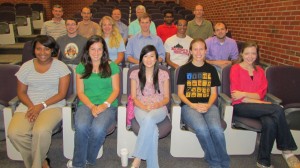
2013 Physical Chemistry Summer Research Program Participants: (front row from left) Terri Turpeau, Sarah Delee, Linh Nguyen, Sarah Adams, Laura Beth Jobe; (middle row) Caleb Swain, Jessica Gray, Ronnie Funk, Sheldon McLetchie, Ryan Scott Bowen; (back row) faculty members Nathan Hammer, Greg Tschumper, Jim Cizdziel, Steven Davis, Amal Dass and Robert Doerksen
OXFORD, Miss. – Ten undergraduate students from across the country gained a wealth of research experience this summer at the University of Mississippi, thanks to a new program funded by the National Science Foundation.
Moreover, some students helped further UM research programs that are searching for new drugs to treat a range of human ailments, including Alzheimer’s disease, bipolar disorder and some cancers. Others focused on projects that expand knowledge in several chemistry disciplines.
The Research Experience for Undergraduates, commonly referred to at Ole Miss as the Physical Chemistry Summer Research Program, recruited students who had completed at least their first year of college but had not yet graduated. REU researchers gained hands-on experience covering a broad range of topics related primarily to chemistry.
“One goal of the program is to give a research experience to undergrads by involving them in real research projects,” said Robert Doerksen, a REU program participant and associate professor of medicinal chemistry in the UM School of Pharmacy. “By doing so, the students are able to test their abilities and expand their ideas of what further educational path to follow.”
Doerksen’s project focused on understanding and quantifying the interactions of small-molecule inhibitors with two protein kinases, which are attractive targets for drug design. Caleb Swain, a rising senior at the Georgia Southern University in Georgia, and Laura Beth Jobe, a rising senior from Erskine College in South Carolina, helped Doerksen with the project.
“The interactions between a drug target (protein kinase), a potential drug ligand and water improve the binding affinity of the ligand for the protein kinase active site,” Jobe said.
By helping the drug ligands bind to the target, the researchers hope to block the protein kinases’ ability to cause cellular processes that trigger diseases and other human ailments.
“This blocking is desirable in the treatment of many diseases such as Alzheimer’s disease, bipolar disorder and certain types of cancer,” Jobe said.
The REU program also enables students to conduct meaningful research, Doerksen said.
“By having intelligent researchers contribute, we can help scientific progress,” he said. “It is important to have more students involved in scientific research to help them effectively decide upon a career path and ultimately to make them more effective citizens.”
Jobe said that her experience in the program solidified her decision to attend medical school.
“My goal of becoming a practicing physician and my interest in medical research has been enhanced through my participation in research at the University of Mississippi,” she said. “Conducting research during the summer afforded me not only an accelerated means of achieving my career goals by providing me with vital research connections and the discovery of my areas of interest but also an exciting opportunity to begin scientific discovery prior to medical school.”
At the end of the program, student researchers completed an analysis, report and presentation of their research. One of the program’s long-term goals is for the students’ research to appear in an article in a peer-reviewed scientific journal, Doerksen said. By doing this, he said, their research will contribute to the betterment of society.
“Based upon my experience in the chemistry and medicinal chemistry departments, I believe that the University of Mississippi fosters an authentic love of learning by pushing students to reach their fullest potential and cultivate resourcefulness and an excellent work ethic, while providing them with the support and encouragement they need to persevere in their tasks,” Jobe said.
Now that the first year of the three-year NSF grant is complete, participants have evaluated and assessed the program and expect to keep it “prospering well into the future,” Doerksen said.
For more information about the Research Experience for Undergraduates Program, visit http://reu.chem.olemiss.edu.